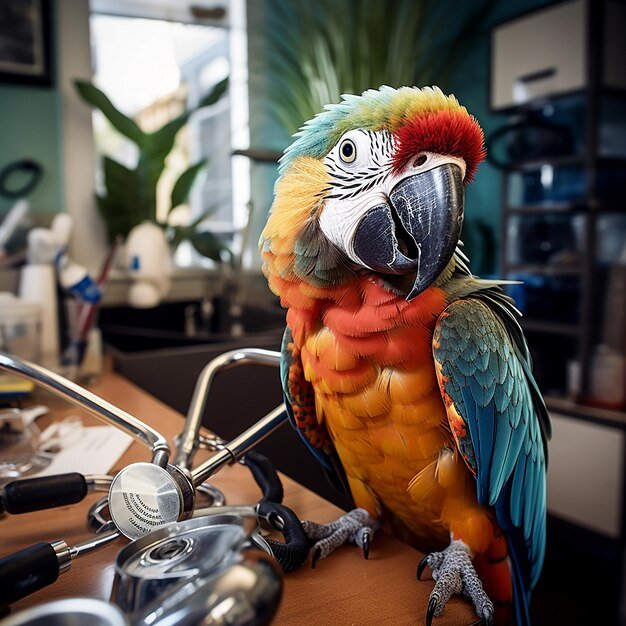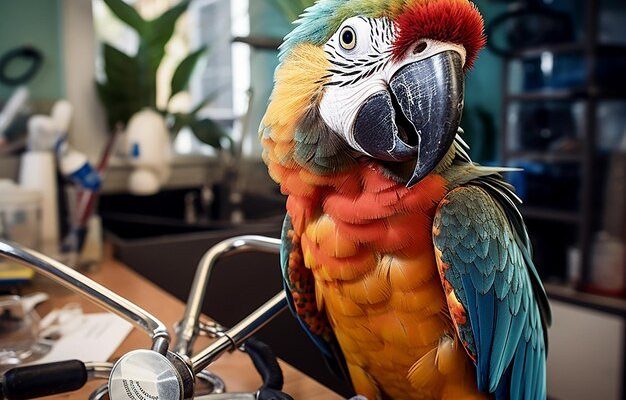
Imagine your parrot as a tiny, colorful actor on a big stage. When it’s healthy, it performs with energy, singing and moving around like it owns the place. But if the show takes a turn and your little actor seems to drop its lines or fade into the background, it could be a sign that something’s wrong. Knowing how to recognize these changes can make a big difference. Let’s dive into the signs to watch for and discuss when you really should seek professional help.
Behavior Changes: The First Red Flag
One of the most noticeable signs that your parrot might be sick is a sudden change in behavior. Birds are social and curious by nature, so if your parrot suddenly seems withdrawn or less active than usual, it’s time to pay attention.
For example, if your parrot used to greet you with excited chirps but now sits quietly in its cage, that’s a change worth noting. It could be feeling lethargic, which is often a primary indicator of illness. Also, if your parrot is usually a little chatterbox but suddenly goes silent, it might not be feeling its best.
You might be wondering what other behavioral shifts could signal issues. If your parrot stops playing with favorite toys, or if it starts plucking feathers excessively, these signs often point to underlying health problems. Changes in social interaction or unusual vocalizations can also indicate stress or discomfort. Remember, keeping a close eye on your parrot’s behavior is essential for catching health issues early.
Physical Symptoms: What to Look For
Beyond behavior, you should also be alert for some physical symptoms. Changes in your parrot’s body can reveal a lot about its health status. For instance, if you notice any changes in the feathers—such as ruffled or broken feathers—this could indicate stress or illness. Healthy feathers should look sleek and shiny, while a sick parrot may have feathers that look dull or disheveled.
Next, consider your parrot’s eyes. Bright, alert eyes are a sign of a happy bird. If you see cloudy eyes or any discharge, it may suggest a problem that should be checked out.
Additionally, take note of how your parrot is eating and drinking. If it suddenly refuses food or has changes in its drinking habits, this could spell trouble. Keep an eye on their droppings, too. Healthy droppings should be firm with a mix of colors—changes in their consistency or color can indicate gastrointestinal issues or infections.
Changes in Vocalization: More Than Just Noise
Parrots love to vocalize; it’s part of their charm! So, if your parrot suddenly goes quiet or starts making strange sounds, it’s worth a closer look. A sudden drop in vocalization can mean your parrot is unwell or perhaps feeling anxious.
On the flip side, if it starts squawking excessively or using a different tone than usual, that could be its way of signaling distress or discomfort. For instance, softer, more distressed calls sometimes indicate pain. Just like when your friend sounds off when they’re sick, your parrot’s voice can change too!
Also, consider the time of day your parrot is vocalizing. If it usually sings happily in the morning but just sits quietly instead, it’s a sign to check in on its health. Always remember that vocal changes are important indicators of your parrot’s well-being.
Physical Appearance: What’s Hiding Beneath the Feathers?
The outward appearance of your parrot can tell a big story about its health. Look for signs such as weight loss or an unusually puffed up appearance. A parrot that looks fluffy isn’t always just cold; it could be its way of trying to stay warm due to illness.
Check for swelling around the beak or eyes. This might indicate infection or other health troubles. Also, take a good look at your parrot’s beak and nails. If the beak appears overgrown or there are unusual lumps, it’s worth bringing to a vet’s attention.
Another often overlooked sign is a change in the color of the skin on their feet. Healthy feet should be a vibrant color, but if they look pale or discolored, this can signal underlying health issues. Keeping an eye on these little details can help you catch any potential problems before they escalate.
When to Call the Vet: Timing Is Everything
So, when should you take that leap and visit a vet? It can be tough to know when health concerns warrant a professional check. Generally, if you notice any combination of the symptoms we just discussed—behavior changes, physical symptoms, vocalization shifts, or changes in appearance—it’s smart to consult a veterinarian.
If your parrot seems to be in pain, such as if it’s refusing to eat, that’s a clear sign it’s time to seek help. Additionally, if your bird has been acting strangely for more than a few days without improvement, don’t hesitate to make that call. Early intervention can help prevent more severe health issues down the line.
Here’s the thing: avian vets specialize in bird health, and they can be your best resource. They understand the unique needs of parrots and can offer tailored advice and treatment. Always trust your instincts as a pet owner—if something feels off, it’s better to be safe than sorry.
Understanding the Importance of Regular Check-Ups
Just like humans, parrots benefit from regular check-ups. Think of it as ensuring your feathered friend has a healthy routine. A yearly visit to the vet can help catch potential issues early, even if you don’t notice visible symptoms.
During these visits, your vet can check for common illnesses that affect parrots, perform necessary tests, and provide vaccinations. It’s all part of keeping your parrot’s health in check.
You might also want to ask your vet for tips on how to maintain a healthy environment for your bird, including the right diet, insulation, and social interaction. After all, prevention is often much easier and less stressful than treatment.
Final Thoughts: Being Proactive for Your Parrot’s Health
Caring for a parrot is a rewarding experience, but it comes with the responsibility of being observant and proactive about their health. By recognizing signs that your parrot is sick, like behavior changes, physical symptoms, and vocalization shifts, you can act quickly and seek veterinary care when necessary.
Remember, your parrot relies on you to pay attention to its needs. A little vigilance can make a big difference in ensuring that your colorful companion stays happy and healthy. So, keep those eyes peeled, and don’t hesitate to reach out to your vet if something feels amiss. Your parrot will thank you for it!

